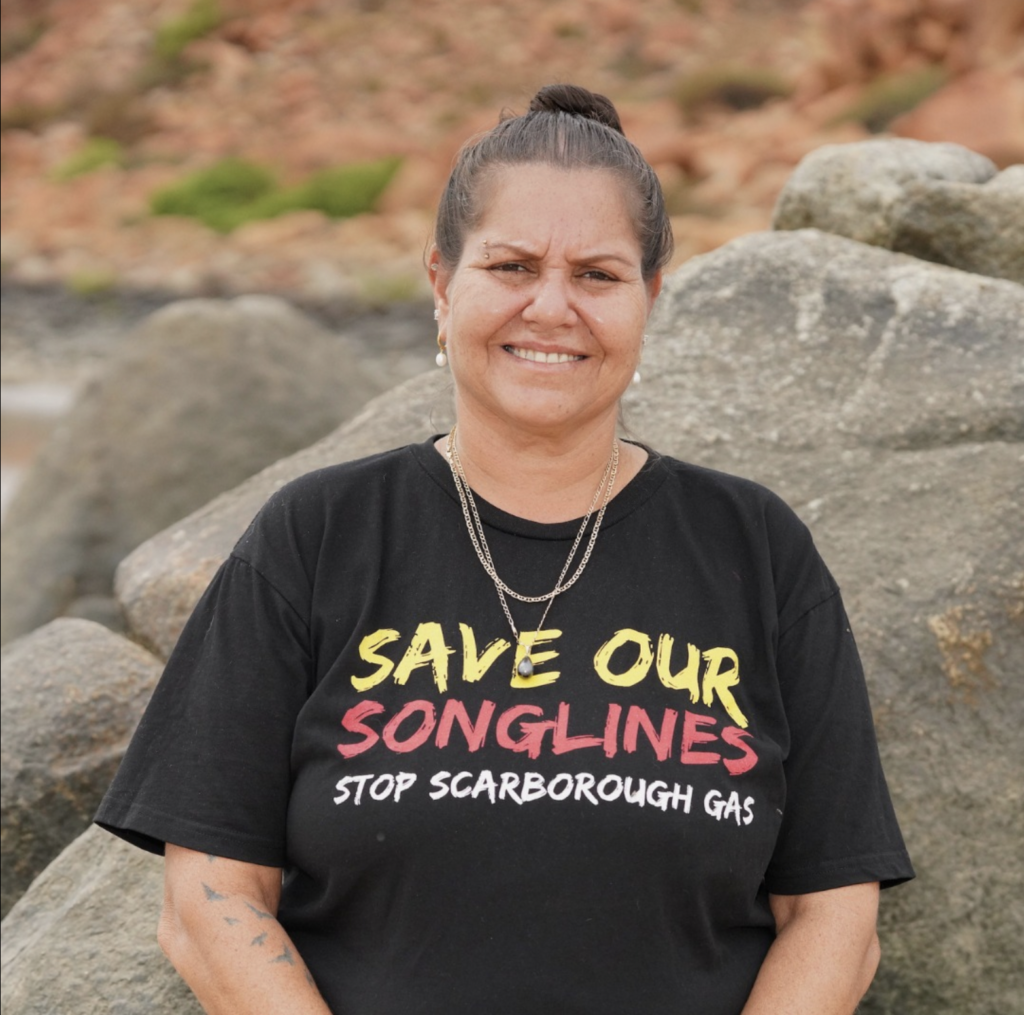A Traditional Custodian will ask the Federal Court to find that approval for Woodside Energy to carry out seismic blasting in her Sea Country was unlawful.
Gas giant Woodside said last week it was ready to begin seismic blasting for its Scarborough Gas Project, despite objections from Custodians who say they still have not been properly consulted, as required.
Woodside’s Scarborough project is a for-export LNG proposal off Murujuga/the Burrup Peninsula in Western Australia, which will result in the release of an estimated 878.02 million tonnes of carbon dioxide over its lifetime.
Mardudhunera Traditional Custodian Raelene Cooper is deeply concerned about the seismic activity’s impact on their Sea Country including on whales and turtles, which are of high cultural importance.
She says she has not been given a chance to explain this properly to Woodside and has applied for a judicial review of the offshore regulator NOPSEMA’s decision to approve the blasts.
Despite finding that Woodside’s consultation with First Nations stakeholders, required by law, had been inadequate, NOPSEMA gave approval for the testing on July 31. Conditions were attached to the approval that further consultation needed to be carried out before commencement of the blasting.
Ms Cooper argues that NOPSEMA cannot grant the approval until she has been properly consulted; and alternatively that Woodside cannot begin seismic testing until Woodside has consulted with her, as required under the conditions of Woodside’s approval from NOPSEMA.
Plaintiff Raelene Cooper said:
“We can’t stress the importance and urgency of the government officials and climate activists to make a stand and do the right thing and stop this atrocious misconduct and use of these ocean blasting methods.
“The activities happening in our Sea Country are affecting places of cultural significance and disrupting our Songlines.

“The whales are showing us all around the world that they are in trouble, and if they are in trouble then so is our very existence.
“Woodside are not above the law and they’re not above our cultural lore.”
EDO Special Counsel Clare Lakewood said:
“Woodside has failed to adequately consult with our client about this seismic blasting, which could have serious impacts on her Sea Country and Songlines.
“They have not taken the time to gather all the relevant information about our client’s Sea Country and interests. In particular, our client has deep concerns about the seismic blasting’s effect on whales – which are highly culturally significant.
“NOPSEMA approved this blasting on July 31, but said more consultation needed to be done, because what Woodside has done so far didn’t meet NOPSEMA’s requirements.
“Last week, less than a fortnight later, Woodside said they were ready to start seismic blasting. How could they possibly have done meaningful, respectful and thorough consultation in that short time?”
Background
Seismic testing involves blasting compressed air from a specially adapted ship. The noise from the blasts causes sound waves to bounce off the seabed back to sensors carried by the ship. It’s done to map fossil fuel reserves as a precursor to drilling.
The impact of seismic blasting on marine animals such as whales can include damage to the sensors that they use to hear, ability to communicate through their electro-frequencies, stress, displacement from habitat, physical injuries and death.
In 2022, EDO client Dennis Tipakalippa successfully challenged approvals granted by NOPSEMA to gas company Santos for drilling its Barossa Gas Project, north of the Tiwi Islands. During the hearing Mr Tipakalippa and other Tiwi Traditional Owners demonstrated their deep cultural connection to the Sea Country, including through On-Country evidence.
The court agreed with Mr Tipakalippa and the Munupi clan that they had not been properly consulted on the project as stakeholders, as required by law, and overturned the approval. The decision was upheld on appeal by the Full bench of the Federal Court in November.





